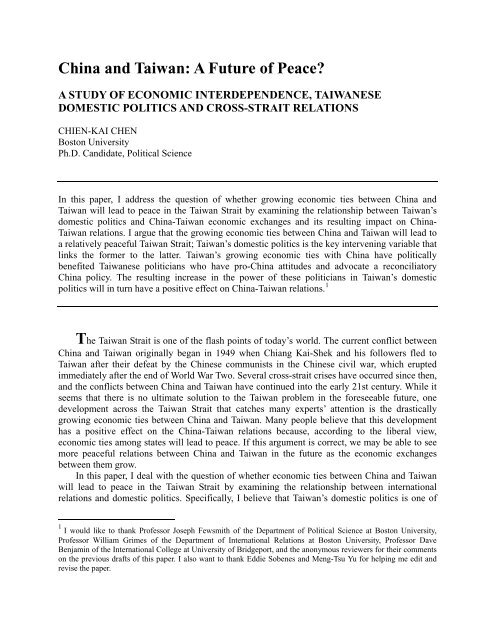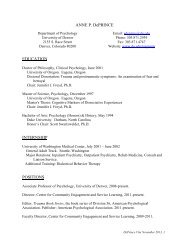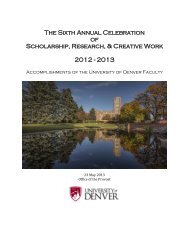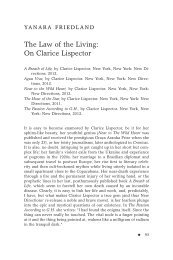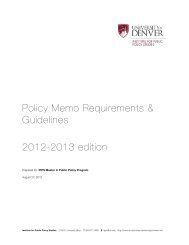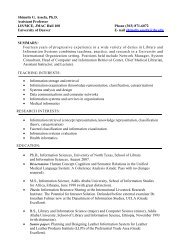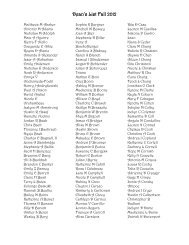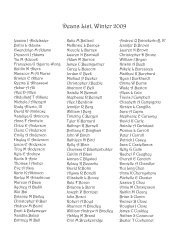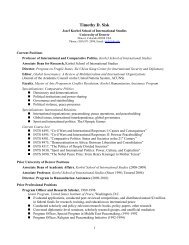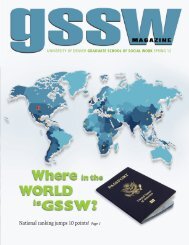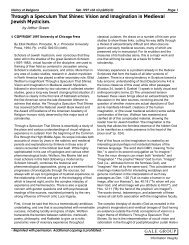Chien-Kai Chen, “China and Taiwan: A Future of Peace? A Study of ...
Chien-Kai Chen, “China and Taiwan: A Future of Peace? A Study of ...
Chien-Kai Chen, “China and Taiwan: A Future of Peace? A Study of ...
Create successful ePaper yourself
Turn your PDF publications into a flip-book with our unique Google optimized e-Paper software.
China <strong>and</strong> <strong>Taiwan</strong>: A <strong>Future</strong> <strong>of</strong> <strong>Peace</strong>?<br />
A STUDY OF ECONOMIC INTERDEPENDENCE, TAIWANESE<br />
DOMESTIC POLITICS AND CROSS-STRAIT RELATIONS<br />
CHIEN-KAI CHEN<br />
Boston University<br />
Ph.D. C<strong>and</strong>idate, Political Science<br />
In this paper, I address the question <strong>of</strong> whether growing economic ties between China <strong>and</strong><br />
<strong>Taiwan</strong> will lead to peace in the <strong>Taiwan</strong> Strait by examining the relationship between <strong>Taiwan</strong>’s<br />
domestic politics <strong>and</strong> China-<strong>Taiwan</strong> economic exchanges <strong>and</strong> its resulting impact on China-<br />
<strong>Taiwan</strong> relations. I argue that the growing economic ties between China <strong>and</strong> <strong>Taiwan</strong> will lead to<br />
a relatively peaceful <strong>Taiwan</strong> Strait; <strong>Taiwan</strong>’s domestic politics is the key intervening variable that<br />
links the former to the latter. <strong>Taiwan</strong>’s growing economic ties with China have politically<br />
benefited <strong>Taiwan</strong>ese politicians who have pro-China attitudes <strong>and</strong> advocate a reconciliatory<br />
China policy. The resulting increase in the power <strong>of</strong> these politicians in <strong>Taiwan</strong>’s domestic<br />
politics will in turn have a positive effect on China-<strong>Taiwan</strong> relations. 1<br />
The <strong>Taiwan</strong> Strait is one <strong>of</strong> the flash points <strong>of</strong> today’s world. The current conflict between<br />
China <strong>and</strong> <strong>Taiwan</strong> originally began in 1949 when Chiang <strong>Kai</strong>-Shek <strong>and</strong> his followers fled to<br />
<strong>Taiwan</strong> after their defeat by the Chinese communists in the Chinese civil war, which erupted<br />
immediately after the end <strong>of</strong> World War Two. Several cross-strait crises have occurred since then,<br />
<strong>and</strong> the conflicts between China <strong>and</strong> <strong>Taiwan</strong> have continued into the early 21st century. While it<br />
seems that there is no ultimate solution to the <strong>Taiwan</strong> problem in the foreseeable future, one<br />
development across the <strong>Taiwan</strong> Strait that catches many experts’ attention is the drastically<br />
growing economic ties between China <strong>and</strong> <strong>Taiwan</strong>. Many people believe that this development<br />
has a positive effect on the China-<strong>Taiwan</strong> relations because, according to the liberal view,<br />
economic ties among states will lead to peace. If this argument is correct, we may be able to see<br />
more peaceful relations between China <strong>and</strong> <strong>Taiwan</strong> in the future as the economic exchanges<br />
between them grow.<br />
In this paper, I deal with the question <strong>of</strong> whether economic ties between China <strong>and</strong> <strong>Taiwan</strong><br />
will lead to peace in the <strong>Taiwan</strong> Strait by examining the relationship between international<br />
relations <strong>and</strong> domestic politics. Specifically, I believe that <strong>Taiwan</strong>’s domestic politics is one <strong>of</strong><br />
1 I would like to thank Pr<strong>of</strong>essor Joseph Fewsmith <strong>of</strong> the Department <strong>of</strong> Political Science at Boston University,<br />
Pr<strong>of</strong>essor William Grimes <strong>of</strong> the Department <strong>of</strong> International Relations at Boston University, Pr<strong>of</strong>essor Dave<br />
Benjamin <strong>of</strong> the International College at University <strong>of</strong> Bridgeport, <strong>and</strong> the anonymous reviewers for their comments<br />
on the previous drafts <strong>of</strong> this paper. I also want to thank Eddie Sobenes <strong>and</strong> Meng-Tsu Yu for helping me edit <strong>and</strong><br />
revise the paper.
Josef Korbel Journal <strong>of</strong> Advanced International Studies - 15<br />
the keys to underst<strong>and</strong>ing the development <strong>of</strong> good relations between China <strong>and</strong> <strong>Taiwan</strong>.<br />
Therefore, in order to probe the relationship between the cross-strait economic ties <strong>and</strong> crossstrait<br />
relations, we should study the relationship between <strong>Taiwan</strong>’s economic ties with China <strong>and</strong><br />
<strong>Taiwan</strong>’s domestic politics. In other words, <strong>Taiwan</strong>’s domestic politics is an important<br />
intervening variable that links cross-strait economic ties to China-<strong>Taiwan</strong> relations. This<br />
analytical framework is shown as figure 1 below.<br />
Figure1: The analytical framework <strong>of</strong> this paper<br />
The economic ties between China <strong>and</strong> <strong>Taiwan</strong><br />
↓<br />
<strong>Taiwan</strong>’s domestic politics<br />
↓<br />
The relations between China <strong>and</strong> <strong>Taiwan</strong><br />
When <strong>Taiwan</strong>’s domestic politics is taken into account, I find that the growing economic ties<br />
between China <strong>and</strong> <strong>Taiwan</strong> do have a positive effect on cross-strait relations. This paper is<br />
divided into three parts. First, I will discuss the literature concerning general arguments about<br />
economic ties <strong>and</strong> peace <strong>and</strong> what scholars have found about the case <strong>of</strong> the <strong>Taiwan</strong> Strait.<br />
Second, I will examine why <strong>Taiwan</strong>’s domestic politics is one <strong>of</strong> the keys to underst<strong>and</strong>ing the<br />
development <strong>of</strong> relations between China <strong>and</strong> <strong>Taiwan</strong>. In the third part <strong>of</strong> this paper, I will link<br />
cross-strait economic ties to China-<strong>Taiwan</strong> relations through <strong>Taiwan</strong>’s domestic politics,<br />
especially focusing on how growing economic ties led to the emergence <strong>of</strong> change in political<br />
coalitions in <strong>Taiwan</strong>’s 2000, 2004 <strong>and</strong> 2008 presidential elections; <strong>and</strong> how this change impacted<br />
cross-strait relations.<br />
Literature Review: Economic Ties <strong>and</strong> Relations between China <strong>and</strong> <strong>Taiwan</strong><br />
The effect <strong>of</strong> economic ties on war <strong>and</strong> peace is a popular topic in the field <strong>of</strong> international<br />
relations. However, findings concerning the relationship between economic ties <strong>and</strong> peace vary.<br />
According to liberals (e.g., Oneal et al. 1996; Oneal <strong>and</strong> Russett 1999; Russett <strong>and</strong> Oneal 2001),<br />
economic ties between states lead to peace. Liberals make three broad points (Kastner 2006, 320).<br />
First, the costs <strong>of</strong> waging a war against your economic partner are very high. Simply speaking, if<br />
you fight against a state with which you trade <strong>and</strong> in which you invest, you actually fight against<br />
yourself because a war between you <strong>and</strong> that state must have a negative effect on your own<br />
economy. Second, economic ties change states’ preferences. When economic ties between two<br />
states become stronger <strong>and</strong> these two states become more economically interdependent or even<br />
integrated, economic interests – compared with other national interests such as military buildup –<br />
become the most important. Third, strong economic ties make non-military threats such as<br />
economic sanctions credible. Therefore, when there is a conflict between two states that have<br />
strong economic ties, a non-military threat is more likely to be the choice.<br />
There are realist theories contradicting the liberal views mentioned above, such as the<br />
relative gains theory (Grieco 1998). Based on this theory, for a state that is asymmetrically<br />
dependent on another state, the fact that it gains relatively less while its partner gains relatively
China <strong>and</strong> <strong>Taiwan</strong>: A <strong>Future</strong> <strong>of</strong> <strong>Peace</strong>? - 16<br />
more will make it feel economically insecure <strong>and</strong>, thus, national security will be more important<br />
than economic benefits. From this point <strong>of</strong> view, economic interdependence does not necessarily<br />
lead to peace. A study <strong>of</strong> trade between Japan <strong>and</strong> the United States by Robert Gilpin (2003) also<br />
appears to rebut liberal views on the relationship between interdependence <strong>and</strong> peace. He argues<br />
that economic interdependence may be a source <strong>of</strong> conflict: Japan’s large trade surplus resulting<br />
from Japan’s unique trade pattern, which focuses on “inter-industry” rather than “intra-industry”<br />
trade with the U.S., has been the main source <strong>of</strong> economic conflict between the two states.<br />
There are also studies showing that the relationship between economic interdependence <strong>and</strong><br />
peace is actually more complicated than both liberals <strong>and</strong> realists think. For example, according<br />
to Katherine Barbieri (1996), the relationship is not linear but curvilinear: while a low to<br />
moderate level <strong>of</strong> interdependence may lead to peace, a high level <strong>of</strong> interdependence increases<br />
the likelihood <strong>of</strong> conflict. The theory <strong>of</strong> trade expectations (Copel<strong>and</strong> 1996) also demonstrates<br />
that the expectations <strong>of</strong> future trade have an effect on the relationship between interdependence<br />
<strong>and</strong> peace: if highly interdependent states expect that the level <strong>of</strong> their trade will remain high in<br />
the future, interdependence brings about peace; in contrast, if they expect that the level will<br />
become low, interdependence may lead to conflicts because highly dependent states are more<br />
likely to initiate war for fear <strong>of</strong> being cut <strong>of</strong>f; thus, losing national wealth as well as long-term<br />
national security.<br />
The conflict between China <strong>and</strong> <strong>Taiwan</strong> is, arguably, one <strong>of</strong> the best opportunities to<br />
examine whether economic ties lead to peace given their more than fifty years <strong>of</strong> rivalry <strong>and</strong> the<br />
drastically growing economic ties between them over the past decade. However, like the general<br />
debate on the relationship between economic ties <strong>and</strong> peace, there is no consensus on whether<br />
the growing economic ties between China <strong>and</strong> <strong>Taiwan</strong> are leading or will lead to peace in the<br />
<strong>Taiwan</strong> Strait. Based on liberal views, it is argued that when the economic ties between China<br />
<strong>and</strong> <strong>Taiwan</strong> become stronger, war in the <strong>Taiwan</strong> Strait becomes highly unlikely (Karen 2002).<br />
War will have a negative effect on the economic development for both sides. In addition,<br />
economic ties enhance common economic interests between China <strong>and</strong> <strong>Taiwan</strong>, making political<br />
reconciliation possible.<br />
There are those who do not believe that economic ties across the <strong>Taiwan</strong> Strait will lead to<br />
peace. Scott Kastner (2006) found that evidence for the liberal views on the relationship between<br />
economic ties <strong>and</strong> peace is ambiguous in the case <strong>of</strong> China-<strong>Taiwan</strong> relations. Although economic<br />
ties are growing, each side seems to have no intention to treat the other side well: while the<br />
Chinese leaders continue to threaten <strong>Taiwan</strong> verbally <strong>and</strong> at times militarily, <strong>Taiwan</strong>ese leaders<br />
continue to provoke China. It is also argued by some that the economic integration between<br />
China <strong>and</strong> <strong>Taiwan</strong> will not decrease the likelihood <strong>of</strong> conflict because the main problem that<br />
triggers the rivalry is a highly politicized issue – the issues <strong>of</strong> identity <strong>and</strong> sovereignty. It is hard<br />
to imagine that either China or <strong>Taiwan</strong> will compromise on these issues (Crane 1993; Chao<br />
2003).<br />
Deng Ping (2000) applied the relative gains theory to <strong>Taiwan</strong>’s economic policies<br />
concerning China-<strong>Taiwan</strong> economic ties. He found that economic interdependence between<br />
China <strong>and</strong> <strong>Taiwan</strong> is actually an asymmetrical one: an excess <strong>of</strong> domestic capital outflow from<br />
<strong>Taiwan</strong> to China can be regarded as evidence <strong>of</strong> asymmetrical interdependence in which China<br />
gains relatively more than <strong>Taiwan</strong> does. Because <strong>of</strong> this, some <strong>Taiwan</strong>ese political leaders are<br />
worried that <strong>Taiwan</strong> is too economically dependent on China. China is much less economically<br />
dependent on <strong>Taiwan</strong>, <strong>and</strong> despite <strong>Taiwan</strong>ese merchants’ investment, <strong>Taiwan</strong> is gradually being
Josef Korbel Journal <strong>of</strong> Advanced International Studies - 17<br />
economically “hollowed out” by China. 2 Furthermore, these leaders believe that it is China’s<br />
strategy to make <strong>Taiwan</strong> economically dependent on China in order to not only hollow out<br />
<strong>Taiwan</strong>’s economy but also use <strong>Taiwan</strong>ese merchants, who have economic interests in China, to<br />
influence the <strong>Taiwan</strong>ese government’s China policy. Therefore, these leaders argue that national<br />
security is more important than economic benefits.<br />
After reviewing the literature concerning the relationship between economic ties <strong>and</strong> peace,<br />
especially those dealing with the case <strong>of</strong> cross-strait relations, I find that scholars tend to use<br />
states that are economically interdependent as their units <strong>of</strong> analysis. While it is reasonable to see<br />
a state as an independent actor in the international system because it has its own preferences <strong>and</strong><br />
behaves rationally based on these preferences, it is also undeniable that a state’s preferences or<br />
foreign policies are formed through a decision-making process embedded in domestic politics<br />
(Putnam 1988). I believe that we would benefit from taking this perspective into account when<br />
exploring the issue <strong>of</strong> economic ties <strong>and</strong> peace among states. In terms <strong>of</strong> my topic I think that<br />
<strong>Taiwan</strong>’s domestic politics does play a critical role in the relationship between cross-strait<br />
economic ties <strong>and</strong> development <strong>of</strong> cross-strait relations. In the remaining parts <strong>of</strong> my paper, I<br />
will use <strong>Taiwan</strong>’s domestic politics as an intervening variable to link economic ties between<br />
China <strong>and</strong> <strong>Taiwan</strong> to China-<strong>Taiwan</strong> relations.<br />
<strong>Taiwan</strong>’s Domestic Politics <strong>and</strong> Cross-Strait Relations<br />
<strong>Taiwan</strong>’s domestic politics became relevant to cross-strait relations when the<br />
democratization <strong>of</strong> <strong>Taiwan</strong> during the 1990s complicated the essence <strong>of</strong> the conflict. Although<br />
the rivalry between China <strong>and</strong> <strong>Taiwan</strong> persisted from 1949 to the present, the essence <strong>of</strong> this<br />
rivalry has changed since the 1990s when <strong>Taiwan</strong>’s then-president Lee Teng-Hui promoted<br />
“<strong>Taiwan</strong>ese identity” in the course <strong>of</strong> <strong>Taiwan</strong>’s democratization, which eventually led to the<br />
emergence <strong>of</strong> “<strong>Taiwan</strong>ese nationalism.” 3 Before the 1990s, the conflict between China <strong>and</strong><br />
<strong>Taiwan</strong> was regarded as a “domestic affair” by both sides. During that period, the government <strong>of</strong><br />
the People’s Republic <strong>of</strong> China in Beijing <strong>and</strong> the government <strong>of</strong> the Republic <strong>of</strong> China in Taipei<br />
fought over which was the only legitimate government <strong>of</strong> China as a whole. Simply speaking,<br />
the conflict between China <strong>and</strong> <strong>Taiwan</strong> during that time was undoubtedly regarded by both sides<br />
as a domestic conflict between “the Chinese in mainl<strong>and</strong> China” <strong>and</strong> “the Chinese in <strong>Taiwan</strong>” in<br />
the “Chinese civil war.”<br />
After <strong>Taiwan</strong>ese identity was promoted by the ruling Kuomintang (KMT) party – which was<br />
led by Lee Teng-Hui before 2000 <strong>and</strong> supported by the opposition Democratic Progress Party<br />
(DPP) during the 1990s – China still saw the <strong>Taiwan</strong> problem as a domestic affair. But there were<br />
some in <strong>Taiwan</strong> who began to regard the rivalry as an international issue. However, at the same<br />
time, there were still other people in <strong>Taiwan</strong> who believed that the conflict between China <strong>and</strong><br />
<strong>Taiwan</strong> was essentially a domestic conflict between the Chinese in mainl<strong>and</strong> China <strong>and</strong> the<br />
2 It is called the “hollowing out” theory. For a discussion about this theory, see Deng, Ping. 2000. “<strong>Taiwan</strong>’s<br />
Restriction <strong>of</strong> Investment in China in the 1990s: A Relative Gains Approach.” Asian Survey 40(6): 971-973.<br />
3 In this paper, I argue that the emergence <strong>of</strong> <strong>Taiwan</strong>ese identity in <strong>Taiwan</strong>’s domestic politics changes the essence <strong>of</strong><br />
the conflict between China <strong>and</strong> <strong>Taiwan</strong>. However, I will not discuss how <strong>and</strong> why <strong>Taiwan</strong>ese identity emerges. For<br />
the discussions about <strong>Taiwan</strong>ese identity, see Chu, Yun-Han. 2004. “<strong>Taiwan</strong>’s National Identity Politics <strong>and</strong> the<br />
Prospect <strong>of</strong> Cross-Strait Relations.” Asian Survey 44(4): 497-503; <strong>and</strong> White, Lynn. 2004. “<strong>Taiwan</strong>’s External<br />
Relations: Identity versus Security,” in The International Relations <strong>of</strong> Northeast Asia, edited by Samuel Kim,<br />
Lanham, MD: Rowman & Littlefield Publisher Inc: 306-308.
China <strong>and</strong> <strong>Taiwan</strong>: A <strong>Future</strong> <strong>of</strong> <strong>Peace</strong>? - 18<br />
Chinese in <strong>Taiwan</strong>. Since <strong>Taiwan</strong>’s 2000 presidential election in which <strong>Chen</strong> Shui-Bian, the DPP<br />
c<strong>and</strong>idate who supported <strong>Taiwan</strong>ese nationalism, was elected, <strong>Taiwan</strong>’s domestic politics has<br />
been dominated by two political forces: “Pan-Green,” which consists <strong>of</strong> the DPP politicians as<br />
well as Lee Teng-Hui <strong>and</strong> his political followers who left KMT <strong>and</strong> established a new political<br />
party named <strong>Taiwan</strong> Solidarity Union (TSU); <strong>and</strong> “Pan-Blue,” which includes the KMT<br />
politicians who forced Lee Teng-Hui to leave KMT in 2000, <strong>and</strong> the politicians in People First<br />
Party (PFP) – which was established by a politician who disagreed with Lee Teng-Hui’s political<br />
position. The core <strong>of</strong> the conflict between China <strong>and</strong> <strong>Taiwan</strong> is now seen differently by different<br />
political forces in <strong>Taiwan</strong>: while Pan-Green regards the conflict as an international conflict<br />
between Chinese <strong>and</strong> <strong>Taiwan</strong>ese, Pan-Blue regards it as a domestic conflict between the Chinese<br />
in mainl<strong>and</strong> China <strong>and</strong> in <strong>Taiwan</strong>.<br />
This new situation in <strong>Taiwan</strong>’s domestic politics has a large effect on the development <strong>of</strong><br />
China-<strong>Taiwan</strong> relations. It leads China to develop a dual attitude towards <strong>Taiwan</strong>, <strong>and</strong> the U.S. to<br />
apply a dual strategy regarding the issue <strong>of</strong> cross-strait relations. Given that Pan-Blue’s position<br />
on China-<strong>Taiwan</strong> relations (cross-strait relations are the “domestic” relations between the<br />
“Chinese” in mainl<strong>and</strong> China <strong>and</strong> the “Chinese” in <strong>Taiwan</strong>) implicitly indicates China-<strong>Taiwan</strong><br />
unification, <strong>and</strong> that Pan-Green’s position (the cross-strait relations are the “international”<br />
relations between “Chinese” <strong>and</strong> “<strong>Taiwan</strong>ese”) implicitly rejects unification, China has become<br />
increasingly friendly to Pan-Blue <strong>and</strong> increasingly aggressive to Pan-Green. Before the 1990s,<br />
the United States had to deter China from militarily attacking <strong>Taiwan</strong>. However, given the fact<br />
that <strong>Taiwan</strong>ese identity has been emerging since the 1990s <strong>and</strong> many <strong>Taiwan</strong>ese leaders since<br />
then have promoted <strong>and</strong> supported <strong>Taiwan</strong>ese identity (e.g., Lee Teng-Hui <strong>and</strong> <strong>Chen</strong> Shui-Bian),<br />
the U.S. now has to apply a dual strategy to deal with the cross-strait issue: militarily deterring<br />
China from attacking <strong>Taiwan</strong>, while politically deterring <strong>Taiwan</strong> from declaring independence<br />
(Christensen 2001, 34-38).<br />
To recapitulate, <strong>Taiwan</strong>’s domestic political development during the 1990s resulted in the<br />
emergence <strong>of</strong> <strong>Taiwan</strong>ese nationalism <strong>and</strong> in turn led to the emergence <strong>of</strong> two political forces in<br />
<strong>Taiwan</strong>’s domestic politics: the force <strong>of</strong> pro-<strong>Taiwan</strong>ese nationalism currently represented by Pan-<br />
Green, <strong>and</strong> the force <strong>of</strong> pro-Chinese nationalism currently represented by Pan-Blue. Here, what<br />
should be emphasized is that the outcome <strong>of</strong> the political conflict between these two forces in<br />
<strong>Taiwan</strong>’s domestic politics would have a critical effect on the China-<strong>Taiwan</strong> relations <strong>and</strong> the<br />
relations in the <strong>Taiwan</strong> Strait. The most dangerous prospect affecting peace in the <strong>Taiwan</strong> Strait<br />
is either a Chinese attack against <strong>Taiwan</strong> without <strong>Taiwan</strong>’s provocation, or a <strong>Taiwan</strong>ese<br />
provocation that triggers a justified Chinese attack. The former danger is unlikely to occur given<br />
that, according to Robert Ross (2002, 63-71), without <strong>Taiwan</strong>’s provocation China can be<br />
effectively deterred from attacking by the U.S. because China realizes an American intervention<br />
is both capable <strong>and</strong> credible. As for the latter danger (a Chinese attack because <strong>of</strong> <strong>Taiwan</strong>’s<br />
provocation), this is believed to be the most important factor that could lead to a war in the<br />
<strong>Taiwan</strong> Strait. According to Scott Kastner (2006, 351), “the danger <strong>of</strong> war in the <strong>Taiwan</strong> Strait<br />
arises primarily from a willingness <strong>of</strong> <strong>Taiwan</strong>’s leaders to test Beijing’s ‘redline,’ the point at<br />
which Mainl<strong>and</strong> leaders would rather fight a war than accept a certain level <strong>of</strong> <strong>Taiwan</strong>ese<br />
sovereignty.” From this point <strong>of</strong> view, <strong>Taiwan</strong>’s domestic politics plays a key role in the relations<br />
between China <strong>and</strong> <strong>Taiwan</strong>. Specifically, given that <strong>Taiwan</strong>’s president has large constitutional<br />
power to deal with issues concerning national security, foreign affairs <strong>and</strong> cross-strait relations,<br />
which political force wins <strong>Taiwan</strong>’s presidential elections matters a great deal. If a pro-<strong>Taiwan</strong>ese<br />
identity politician wins the presidential election, the likelihood <strong>of</strong> the danger cited by Scott
Josef Korbel Journal <strong>of</strong> Advanced International Studies - 19<br />
Kastner would increase. By contrast, the likelihood would greatly decrease if there were a pro-<br />
Chinese identity president in <strong>Taiwan</strong>. This finding regarding the relationship between <strong>Taiwan</strong>’s<br />
domestic politics <strong>and</strong> the China-<strong>Taiwan</strong> relations can be summarized in figure 2 below.<br />
Figure 2: The relationship between <strong>Taiwan</strong>’s domestic politics <strong>and</strong> the China-<strong>Taiwan</strong><br />
relations<br />
Political competitions between<br />
Pan-Green <strong>and</strong> Pan-Blue<br />
in <strong>Taiwan</strong>’s presidential elections<br />
↓<br />
A Pan-Green<br />
Pro-<strong>Taiwan</strong>ese Identity President<br />
↓<br />
The Likelihood <strong>of</strong> War Increases<br />
↓<br />
A Pan-Blue<br />
Pro-Chinese Identity President<br />
↓<br />
The Likelihood <strong>of</strong> War Decreases<br />
The Economic Ties across the <strong>Taiwan</strong> Strait, <strong>Taiwan</strong>’s Domestic Politics, <strong>and</strong> China-Tai wan<br />
Relations<br />
After discussing why <strong>Taiwan</strong>’s domestic politics now plays a key role in peace or war in the<br />
<strong>Taiwan</strong> Strait, it is time to shift the focus to the main question <strong>of</strong> whether the growing economic<br />
ties between China <strong>and</strong> <strong>Taiwan</strong> will lead to peace in the <strong>Taiwan</strong> Strait. Based on what has been<br />
discussed about the relationship between <strong>Taiwan</strong>’s domestic politics <strong>and</strong> China-<strong>Taiwan</strong> relations,<br />
it is reasonable to argue that in order to examine whether <strong>Taiwan</strong>’s economic ties with China<br />
leads to peace we must explore whether <strong>Taiwan</strong>’s growing economic ties with China politically<br />
benefit pro-Chinese nationalism politicians in <strong>Taiwan</strong>’s domestic politics, especially in<br />
presidential elections.<br />
To probe the relationship between the economic ties across the <strong>Taiwan</strong> Strait <strong>and</strong> <strong>Taiwan</strong>’s<br />
domestic politics, we should first address a key question: does international economy really have<br />
an effect on domestic politics? According to Ronald Rogowski <strong>and</strong> Jeffry Frieden (Rogowski<br />
1989; Frieden & Rogowski 1996), the answer is yes: trade or economic openness will create<br />
political cleavages in domestic politics, leading to conflicts between the people who benefit from<br />
the openness <strong>and</strong> the people who do not. Three phenomena should be found here (Rogowski<br />
1989, 4-5). First, the people who benefit from the economic openness will try to press the policy<br />
makers for more openness, while those who do not benefit from or are harmed by the openness<br />
will try to press the policy makers to resist more openness. Second, those who enjoy a sudden<br />
increase in wealth because <strong>of</strong> the openness will be able to exp<strong>and</strong> their political influence. Third,<br />
the policy makers will try to respond to the pressures from those who benefit from the openness<br />
<strong>and</strong> those who do not.<br />
When it comes to the case <strong>of</strong> <strong>Taiwan</strong>, we do find that growing economic ties between China<br />
<strong>and</strong> <strong>Taiwan</strong> has created a political cleavage. There are obvious economic winners <strong>and</strong> losers in<br />
<strong>Taiwan</strong> as the economic ties between China <strong>and</strong> <strong>Taiwan</strong> grow: while the capitalists who invest in
China <strong>and</strong> <strong>Taiwan</strong>: A <strong>Future</strong> <strong>of</strong> <strong>Peace</strong>? - 20<br />
China <strong>and</strong> the manufacturers who move their factories to China benefit from the growing<br />
economic ties, farmers <strong>and</strong> unskilled workers do not. It is also obvious that the beneficiaries,<br />
who are generally called “<strong>Taiwan</strong>ese businesspeople in China,” always press the <strong>Taiwan</strong>ese<br />
government for more economic ties across the <strong>Taiwan</strong> Strait <strong>and</strong> become increasingly politically<br />
influential not only due to the increase in their population <strong>and</strong> economic power, but also because<br />
<strong>of</strong> the important roles they play in <strong>Taiwan</strong>’s economic development. <strong>Taiwan</strong>ese policy makers<br />
<strong>and</strong> politicians are pressured from both sides <strong>and</strong> trapped in a dilemma <strong>of</strong> more openness or more<br />
restrictions.<br />
Having demonstrated that growing economic ties do have an effect on <strong>Taiwan</strong>’s domestic<br />
politics, it is time to link the economic ties across the <strong>Taiwan</strong> Strait to China-<strong>Taiwan</strong> relations<br />
through <strong>Taiwan</strong>’s domestic politics. I do this by examining whether the growing China-<strong>Taiwan</strong><br />
economic ties politically benefit pro-Chinese identity politicians in <strong>Taiwan</strong>’s domestic politics,<br />
especially in the presidential elections. In the remaining part <strong>of</strong> this section, I will examine how<br />
economic ties between China <strong>and</strong> <strong>Taiwan</strong> led to the emergence <strong>of</strong> <strong>and</strong> change in the two political<br />
coalitions – the coalition <strong>of</strong> Pan-Green with <strong>Taiwan</strong>ese farmers <strong>and</strong> unskilled workers <strong>and</strong> the<br />
coalition <strong>of</strong> Pan-Blue with <strong>Taiwan</strong>ese businesspeople in China – during the 2000, 2004 <strong>and</strong> 2008<br />
<strong>Taiwan</strong>ese presidential elections, <strong>and</strong> its implications for the China-<strong>Taiwan</strong> relations.<br />
Political Coalitions in <strong>Taiwan</strong>’s Presidential Elections from 2000 to 2004<br />
The political cleavage between the people who were benefiting from <strong>Taiwan</strong>’s economic ties<br />
with China <strong>and</strong> the people who were not was not obvious in the 2000 presidential election<br />
because the economic exchanges between China <strong>and</strong> <strong>Taiwan</strong> during that time were suppressed by<br />
the policy <strong>of</strong> “don’t haste, be patient.” The policy was originally implemented by Lee Teng-Hui<br />
in 1996 <strong>and</strong> imposed many restrictions on the economic exchanges between China <strong>and</strong> <strong>Taiwan</strong>.<br />
During that time there was no obvious winner or loser in the cross-strait economic ties in <strong>Taiwan</strong>,<br />
<strong>and</strong>, therefore, there was no dilemma <strong>of</strong> more openness or more restrictions for politicians.<br />
Actually, there was a popular sentiment among <strong>Taiwan</strong>ese in the late 1990s that these restrictions<br />
on cross-strait economic exchanges had a negative effect on <strong>Taiwan</strong>’s economic development<br />
because they made <strong>Taiwan</strong>’s information technology industry, which was the backbone <strong>of</strong><br />
<strong>Taiwan</strong>’s economic development, unable to access the cheap labor in China <strong>and</strong> thus become<br />
internationally uncompetitive. To respond to this popular sentiment, all three major c<strong>and</strong>idates in<br />
<strong>Taiwan</strong>’s 2000 presidential election – <strong>Chen</strong> Shui-Bian, Lien Chan, <strong>and</strong> James Soong – advocated<br />
the relaxation <strong>of</strong> restrictions on the cross-strait economic exchanges imposed by the “don’t haste,<br />
be patient” policy (Chu 2004, 507).<br />
After wining the 2000 presidential election, DPP’s <strong>Chen</strong> Shui-Bian <strong>of</strong>ficially replaced the<br />
“don’t haste, be patient” policy with the “active openness <strong>and</strong> effective management” policy in<br />
October 2001. Its implementation greatly increased the level <strong>of</strong> the economic exchanges between<br />
China <strong>and</strong> <strong>Taiwan</strong> <strong>and</strong> in turn led to new political situations in <strong>Taiwan</strong>’s domestic politics.<br />
First, growing economic ties attracted more <strong>and</strong> more <strong>Taiwan</strong>ese capitalists to invest in <strong>and</strong><br />
manufacturers to move their factories to China. This created an obvious cleavage between the<br />
people who were benefiting from the economic ties <strong>and</strong> those who were not. While <strong>Taiwan</strong>ese<br />
businesspeople asked for more openness <strong>and</strong> the termination <strong>of</strong> bans on postal, transportation,<br />
<strong>and</strong> trade links between China <strong>and</strong> <strong>Taiwan</strong>, <strong>Taiwan</strong>ese farmers <strong>and</strong> unskilled workers began to<br />
worry that more economic openness <strong>and</strong> direct economic links between China <strong>and</strong> <strong>Taiwan</strong> might<br />
harm their economic interests. <strong>Taiwan</strong>ese businesspeople were attracted to the giant market <strong>and</strong>
Josef Korbel Journal <strong>of</strong> Advanced International Studies - 21<br />
cheap labor in China; however, <strong>Taiwan</strong>ese farmers <strong>and</strong> unskilled workers were worried about the<br />
import <strong>of</strong> cheap Chinese agricultural products <strong>and</strong> labor.<br />
Second, the political forces that emerged after the 2000 presidential election (Pan-Green<br />
supporting <strong>Taiwan</strong>ese identity <strong>and</strong> Pan-Blue supporting Chinese identity) exploited this cleavage.<br />
Although <strong>Chen</strong> Shui-Bian, a politician in Pan-Green, dropped the “don’t haste, be patient” policy<br />
<strong>and</strong> introduced the “active openness <strong>and</strong> effective management” policy, he refused the request<br />
for more openness because he believed that <strong>Taiwan</strong>’s growing asymmetrical economic<br />
dependence on China might have a negative effect on <strong>Taiwan</strong>’s national security. Losing the<br />
support from <strong>Taiwan</strong>ese businesspeople in China including those who supported him in 2000,<br />
<strong>Chen</strong> Shui-Bain <strong>and</strong> Pan-Green politicians began to appeal directly to those who were not<br />
benefiting from the growing China-<strong>Taiwan</strong> economic ties. At the same time, Pan-Blue, arguing<br />
that the growing economic ties between China <strong>and</strong> <strong>Taiwan</strong> would benefit <strong>Taiwan</strong>’s economic<br />
development, advocated more openness between China <strong>and</strong> <strong>Taiwan</strong> <strong>and</strong> began to appeal directly<br />
to those who were benefiting from the growing economic ties across the <strong>Taiwan</strong>-Strait. In<br />
addition, the fact that China had a much more friendly attitude towards Pan-Blue due to its<br />
support for Chinese identity made those who had economic interests in China more willing to<br />
vote for Pan-Blue in elections because they believed that a Pan-Blue government was more<br />
likely to create a peaceful <strong>Taiwan</strong>-Strait, which was very important to their business in China.<br />
In summary, after the implementation <strong>of</strong> the “positive openness <strong>and</strong> effective management”<br />
policy in 2001, the growing economic ties between China <strong>and</strong> <strong>Taiwan</strong> created a cleavage<br />
between <strong>Taiwan</strong>ese businesspeople <strong>and</strong> <strong>Taiwan</strong>ese farmers <strong>and</strong> unskilled workers. The resulting<br />
two new political coalitions in <strong>Taiwan</strong>’s domestic politics saw Pan-Blue work with those who<br />
were benefiting from the growing cross-strait economic ties, <strong>and</strong> Pan-Green work with those<br />
who were not. The 2004 presidential election was a competition between these two political<br />
forces, resulting in the victory <strong>of</strong> Pan-Green’s coalition <strong>of</strong> farmers <strong>and</strong> unskilled workers.<br />
Political Coalitions in 2008 <strong>Taiwan</strong>ese Presidential Election <strong>and</strong> the Prospect <strong>of</strong> China-<strong>Taiwan</strong><br />
<strong>Peace</strong><br />
Although the political coalition <strong>of</strong> Pan-Blue <strong>and</strong> those who were benefiting from the<br />
growing cross-strait economic ties was not big enough to be a winning coalition in 2004, it is<br />
reasonable to argue that the constituency consisting <strong>of</strong> those benefiting from the growing<br />
economic ties between China <strong>and</strong> <strong>Taiwan</strong> has become much stronger both quantitatively <strong>and</strong><br />
qualitatively then. According to the <strong>Taiwan</strong>ese government’s estimate, there were roughly one<br />
million <strong>Taiwan</strong>ese living in China, <strong>and</strong> more than 77% <strong>of</strong> <strong>Taiwan</strong> manufacturers had investments<br />
there by 2006 (Kahler & Kastner 2006, 536). These <strong>Taiwan</strong>ese businesspeople became an<br />
important part <strong>of</strong> the whole constituency in <strong>Taiwan</strong>’s 2008 presidential election. Pan-Blue tried<br />
to keep the existing political coalition with them. The Pan-Blue c<strong>and</strong>idate, Ma Ying-Jeou, still<br />
appealed directly to <strong>Taiwan</strong>ese businesspeople in China: pledging that he would create a socalled<br />
“cross-strait common market” once elected. 4 For another thing, the Pan-Green c<strong>and</strong>idate,<br />
4 The idea about the so-called “cross-strait common market” was actively advocated by Ma’s electoral partner in<br />
2008 who is <strong>Taiwan</strong>’s current vice president, Hsiao Wan-Chang. For more details <strong>of</strong> “cross-strait common market,”<br />
see the web pages <strong>of</strong> the Cross-Strait Common Market Foundation (http://www.crossstrait.org/index.php). For the<br />
discussion about the latest development <strong>of</strong> this issue, see Zhao, Hong <strong>and</strong> Tong Sarah. “<strong>Taiwan</strong>-Mainl<strong>and</strong> Economic<br />
Cooperation Framework Agreement (ECFA): Implications for Cross-Strait Relations.” EAI Background Brief No.
China <strong>and</strong> <strong>Taiwan</strong>: A <strong>Future</strong> <strong>of</strong> <strong>Peace</strong>? - 22<br />
Frank Hsieh, seemed to realize that he should not ignore these <strong>Taiwan</strong>ese businesspeople if he<br />
wanted to win the 2008 presidential elections. Although he criticized that creating a “cross-strait<br />
common market” as infeasible <strong>and</strong> too radical, he said that he would introduce a better policy to<br />
lift the unnecessary restrictions on the economic exchanges between China <strong>and</strong> <strong>Taiwan</strong>. In<br />
addition, in order to reassure the <strong>Taiwan</strong>ese businesspeople that he was willing to keep the<br />
<strong>Taiwan</strong> Strait peaceful <strong>and</strong> stable, he seldom discussed the issue <strong>of</strong> <strong>Taiwan</strong> independence in<br />
public <strong>and</strong> even made an argument that <strong>Taiwan</strong> is part <strong>of</strong> China according to the Constitution <strong>of</strong><br />
the Republic <strong>of</strong> China used in <strong>Taiwan</strong>. While Frank Hsieh’s new attitude towards cross-strait<br />
economic ties <strong>and</strong> cross-strait relations may attract some <strong>Taiwan</strong>ese businesspeople, these new<br />
attitudes actually destabilized the political collation <strong>of</strong> Pan-Green with <strong>Taiwan</strong>ese farmers <strong>and</strong><br />
unskilled workers. His pro-openness attitude angered many people who were not benefiting from<br />
the growing economic ties between China <strong>and</strong> <strong>Taiwan</strong>, <strong>and</strong> his ambiguous attitude towards the<br />
essence <strong>of</strong> the China-<strong>Taiwan</strong> relations alienated many Pan-Green, pro-<strong>Taiwan</strong>ese identity<br />
politicians. 5 The presidential election in 2008 was eventually won by the Pan-Blue c<strong>and</strong>idate, Ma<br />
Ying-Jeou, an advocate <strong>of</strong> more cross-strait economic exchanges <strong>and</strong> peaceful China-<strong>Taiwan</strong><br />
relations.<br />
Based on what I have discussed, we can find that the constantly growing economic ties<br />
between China <strong>and</strong> <strong>Taiwan</strong> not only created a cleavage between the people who were benefiting<br />
from these ties <strong>and</strong> those who were not, but also made the former politically stronger because <strong>of</strong><br />
the increase in their population <strong>and</strong> the importance <strong>of</strong> the role they play in <strong>Taiwan</strong>’s economic<br />
development. Although these people did not play a critical role <strong>and</strong> were ignored by the election<br />
winner in <strong>Taiwan</strong>’s 2004 presidential election, it is obvious that they attracted both Pan-Blue <strong>and</strong><br />
Pan-Green c<strong>and</strong>idates in 2008. The increase in the political <strong>and</strong> economical importance <strong>of</strong> this<br />
new constituency <strong>of</strong> people who were benefiting from the growing cross-strait economic ties<br />
even changed the Pan-Green, pro-<strong>Taiwan</strong>ese identity presidential c<strong>and</strong>idate’s attitudes towards<br />
the economic openness <strong>and</strong> the core <strong>of</strong> the China-<strong>Taiwan</strong> relations. This destabilized the political<br />
coalition <strong>of</strong> Pan-Green with the people who were not benefiting from growing cross-strait<br />
economic ties. These developments in <strong>Taiwan</strong>’s domestic politics greatly benefited the Pan-Blue,<br />
pro-Chinese identity presidential c<strong>and</strong>idate in the 2008 election. As mentioned before, if a pro-<br />
Chinese identity c<strong>and</strong>idate is elected, the likelihood <strong>of</strong> war in the <strong>Taiwan</strong> Strait would greatly<br />
decrease. The recent developments in China-<strong>Taiwan</strong> relations, such as the meetings between<br />
<strong>Taiwan</strong>’s quasi-<strong>of</strong>ficial Straits Exchange Foundation <strong>and</strong> China’s quasi-<strong>of</strong>ficial Association for<br />
Relations Across the <strong>Taiwan</strong> Strait in June <strong>and</strong> November 2008, demonstrate that the election <strong>of</strong><br />
Ma Ying-Jeou changed the confrontational nature <strong>of</strong> the China-<strong>Taiwan</strong> relations from 2000 to<br />
2008. In addition, it is worth mentioning again that the increasing political <strong>and</strong> economical<br />
importance <strong>of</strong> the people who were benefiting from the China-<strong>Taiwan</strong> economic ties forced the<br />
452, published by East Asia Institute at National University <strong>of</strong> Singapore on May 21, 2009, accessed through the<br />
web page <strong>of</strong> East Asia Institute at National University <strong>of</strong> Singapore (http://www.eai.nus.edu.sg/BB452.pdf).<br />
5 The publication <strong>of</strong> reports <strong>and</strong> editorials that criticized Hsieh’s position on the China-<strong>Taiwan</strong> relations in the<br />
Liberty Times, a pro Pan-Green newspaper, revealed the emerging gap between Hsieh <strong>and</strong> his potential supporters.<br />
See “Ma <strong>and</strong> Hsieh rush to China: <strong>Taiwan</strong>’s economy will be doomed in 2008” in the Liberty Times (November 26,<br />
2007), accessed through the web page <strong>of</strong> the Liberty Times<br />
(http://www.libertytimes.com.tw/2007/new/nov/26/today-fo2.htm); <strong>and</strong> “Hsieh’s argument that <strong>Taiwan</strong> is part <strong>of</strong><br />
China according to the Constitution <strong>of</strong> the Republic <strong>of</strong> China is the biggest obstacle to his success in the presidential<br />
election” in the Liberty Times (April 21, 2007), accessed through the web page <strong>of</strong> the Liberty Times<br />
(http://libertytimes.com.tw/2007/new/apr/21/today-fo2.htm).
Josef Korbel Journal <strong>of</strong> Advanced International Studies - 23<br />
Pan-Green c<strong>and</strong>idate, Hsieh, to change his attitudes towards economic openness <strong>and</strong> <strong>Taiwan</strong>ese<br />
identity in order to attract these people to vote for him. Therefore, it is reasonable to argue that<br />
Hsieh, though not a pure pro-openness <strong>and</strong> pro-Chinese identity politician like Ma, would be a<br />
president different from <strong>Chen</strong> Shui-Bian if he was elected, <strong>and</strong> the likelihood <strong>of</strong> war in the<br />
<strong>Taiwan</strong> Strait would still decrease to some extent under this counterfactual circumstance. The<br />
finding in this section can be summarized as figure 3 below.<br />
Figure 3: The relationship among the cross-strait economic ties, <strong>Taiwan</strong>’s domestic<br />
politics, <strong>and</strong> the cross-strait relations<br />
the growing economic ties between China <strong>and</strong> <strong>Taiwan</strong><br />
↓<br />
political coalition <strong>of</strong> Pan-Blue <strong>and</strong> <strong>Taiwan</strong>ese businesspeople in China<br />
vs.<br />
political coalition <strong>of</strong> Pan-Green <strong>and</strong> <strong>Taiwan</strong>ese farmers <strong>and</strong> unskilled workers<br />
<strong>and</strong><br />
<strong>Taiwan</strong>ese businesspeople in China are becoming much politically <strong>and</strong><br />
economically stronger<br />
↓<br />
a Pan-Blue pro-Chinese identity president<br />
or<br />
a Pan-Green president who has weak <strong>Taiwan</strong>ese identity<br />
↓<br />
the likelihood <strong>of</strong> war decreases<br />
Conclusion<br />
Whether the growing economic ties between China <strong>and</strong> <strong>Taiwan</strong> lead to peace in the <strong>Taiwan</strong><br />
Strait is an academic <strong>and</strong> pragmatic question. Many arguments concerning this issue tend to<br />
ignore the complexity <strong>of</strong> <strong>Taiwan</strong>’s domestic politics, which has played a very important role in<br />
the development <strong>of</strong> China-<strong>Taiwan</strong> relations since the 1990s when <strong>Taiwan</strong>ese nationalism<br />
emerged in the course <strong>of</strong> <strong>Taiwan</strong>’s democratization. If we take <strong>Taiwan</strong>’s domestic politics into<br />
account, we can find that growing economic ties between China <strong>and</strong> <strong>Taiwan</strong> have a positive<br />
effect on China-<strong>Taiwan</strong> relations. My conclusion is based on two findings.<br />
First, <strong>Taiwan</strong>’s domestic politics, in which the pro-<strong>Taiwan</strong>ese identity force <strong>and</strong> the pro-<br />
Chinese identity force are competing with each other, has a critical effect on China-<strong>Taiwan</strong><br />
relations. Since 2000, <strong>Taiwan</strong>’s domestic politics has been dominated by these two political<br />
forces represented by pro-<strong>Taiwan</strong>ese identity Pan-Green <strong>and</strong> pro-Chinese identity Pan-Blue.<br />
Given that <strong>Taiwan</strong>’s president has large power to deal with issues concerning national security,<br />
foreign affairs <strong>and</strong> cross-strait relations, which force wins <strong>Taiwan</strong>’s presidential election matters.
China <strong>and</strong> <strong>Taiwan</strong>: A <strong>Future</strong> <strong>of</strong> <strong>Peace</strong>? - 24<br />
Therefore, while the election <strong>of</strong> a pro-<strong>Taiwan</strong>ese identity president would increase the likelihood<br />
<strong>of</strong> war between China <strong>and</strong> <strong>Taiwan</strong> because he or she is more willing to test China’s redline about<br />
<strong>Taiwan</strong>’s sovereignty, the election <strong>of</strong> a pro-Chinese identity president would decrease that<br />
likelihood.<br />
Second, the growing economic ties between China <strong>and</strong> <strong>Taiwan</strong> will politically benefit the<br />
pro-Chinese identity coalition. The economic ties between China <strong>and</strong> <strong>Taiwan</strong> create a cleavage<br />
between <strong>Taiwan</strong>ese businesspeople <strong>and</strong> <strong>Taiwan</strong>ese farmers <strong>and</strong> unskilled workers. In <strong>Taiwan</strong>’s<br />
2000 presidential election, this cleavage was not obvious, <strong>and</strong> therefore there was no political<br />
coalition based on this cleavage. However, after the policy <strong>of</strong> “don’t haste, be patient” was<br />
replaced by the policy <strong>of</strong> “positive openness <strong>and</strong> effective management” in 2001, the cross-strait<br />
economic ties drastically grew <strong>and</strong> the cleavage between <strong>Taiwan</strong>ese businesspeople <strong>and</strong><br />
<strong>Taiwan</strong>ese farmers <strong>and</strong> unskilled workers became obvious. Pan-Green <strong>and</strong> Pan-Blue began to<br />
exploit this cleavage to their political advantage. In the 2004 presidential election, Pan-Green<br />
formed a political coalition with those who were not benefiting from the growing economic ties,<br />
while Pan-Blue formed a political coalition with those who were. Although the political coalition<br />
<strong>of</strong> Pan-Green defeated Pan-Blue in 2004, as cross-strait economic ties grew <strong>and</strong> the constituency<br />
consisting <strong>of</strong> <strong>Taiwan</strong>ese businesspeople became politically <strong>and</strong> economically stronger, Pan-Blue<br />
strengthened. The result was the election <strong>of</strong> a pro-Chinese identity president in <strong>Taiwan</strong>’s 2008<br />
election, as well as a change in the Pan-Green presidential c<strong>and</strong>idate’s attitudes towards crossstrait<br />
economic exchanges <strong>and</strong> China-<strong>Taiwan</strong> relations in general. This development in <strong>Taiwan</strong>’s<br />
domestic politics, resulting from the growing cross-strait economic ties, continues to decrease the<br />
likelihood <strong>of</strong> war in the <strong>Taiwan</strong> Strait.<br />
References<br />
Barbieri, Katherine. 1996. “Economic Interdependence: A Path to <strong>Peace</strong> or a Source <strong>of</strong> Interstate<br />
Conflict?” Journal <strong>of</strong> <strong>Peace</strong> Research 33(1): 29-49.<br />
Chao, <strong>Chien</strong>-min. 2003. “Will Economic Integration between Mainl<strong>and</strong> China <strong>and</strong> <strong>Taiwan</strong> Lead<br />
to a Congenial Political Culture?” Asian Survey 43(2): 280-304.<br />
Christensen, Thomas. 2001. “Posing Problems without Catching up: China’s Rise <strong>and</strong><br />
Challenges for US Security Policy.” International Security 25(4): 5-40.<br />
Chu, Yun -Han. 2004. “<strong>Taiwan</strong>’s National Identity Politics <strong>and</strong> the Prospect <strong>of</strong> Cross-Strait<br />
Relations.” Asian Survey 44(4): 497-503.<br />
Copel<strong>and</strong>, Dale. 1996. “Economic Interdependence <strong>and</strong> War: A Theory <strong>of</strong> Trade Expectations.”<br />
International Security 20(4): 5-41.<br />
Crane, George T. 1993. <strong>“China</strong> <strong>and</strong> <strong>Taiwan</strong>: Not Yet ‘Greater China’.” International Affairs<br />
69(4): 705-723.<br />
Deng, Ping. 2000. “<strong>Taiwan</strong>’s Restriction <strong>of</strong> Investment in China in the 1990s: A Relative Gains<br />
Approach.” Asian Survey 40(6): 958-908.
Josef Korbel Journal <strong>of</strong> Advanced International Studies - 25<br />
Frieden, Jeffry <strong>and</strong> Ronald Rogowski. 1996. “The Impact <strong>of</strong> the International Economy on<br />
National Policies: An Analytical Overview” in Internationalization <strong>and</strong> domestic politics, edited<br />
by Robert Keohane <strong>and</strong> Helen Milner, New York, NY: Cambridge University Press.<br />
Gilpin, Robert. 2003. “Sources <strong>of</strong> American-Japanese Economic Conflict” in International<br />
Relations Theory <strong>and</strong> the Asia-Pacific, edited by John Ikenberry <strong>and</strong> Michael Mast<strong>and</strong>uno, New<br />
York, NY: Columbia University Press.<br />
Grieco, Joseph. 1988. “Anarchy <strong>and</strong> the Limits <strong>of</strong> Cooperation.” International Organization<br />
42(3): 485-507.<br />
Kahler, Miles <strong>and</strong> Scott Kastner. 2006. “Strategic Uses <strong>of</strong> Economic Interdependence:<br />
Engagement Policies on the Korean Peninsula <strong>and</strong> Across the <strong>Taiwan</strong> Strait.” Journal <strong>of</strong> <strong>Peace</strong><br />
Research 43(5): 523-541.<br />
Kastner, Scott. 2006. “Does Economic Integration Across the <strong>Taiwan</strong> Strait Make Military<br />
Conflict Less Likely?” Journal <strong>of</strong> East Asian Studies 6: 319-346.<br />
Kastner, Scott. 2006. “The Economics <strong>of</strong> Cross-Strait Relations: A Reply to Ming Wan.”<br />
Journal <strong>of</strong> Asian Studies 6: 350-351.<br />
Oneal, John, Frances Oneal, Zeev Maoz, <strong>and</strong> Bruce Russett. 1996. “The Liberal <strong>Peace</strong>:<br />
Interdependence, Democracy, <strong>and</strong> International Conflict, 1950-85.” Journal <strong>of</strong> <strong>Peace</strong> Research<br />
33(1): 11-28.<br />
Oneal, John <strong>and</strong> Bruce Russett. 1999. “Assessing the Liberal <strong>Peace</strong> with Alternative<br />
Specifications: Trade Still Reduces Conflict.” Journal <strong>of</strong> <strong>Peace</strong> Research 36(4): 423-442.<br />
Putnam, Robert. 1988. “Diplomacy <strong>and</strong> Domestic politics: The Logic <strong>of</strong> Two-Level Games.”<br />
International Organization 42(3): 427-460.<br />
Rogowski, Ronald. 1989. Commerce <strong>and</strong> Coalitions: How Trade Affects Domestic Political<br />
Alignments, Princeton, NJ: Princeton University Press.<br />
Ross, Robert. 2002. “Navigating the <strong>Taiwan</strong> Strait: Deterrence, Escalation Dominance, <strong>and</strong> US-<br />
China Relations.” International Security 27(2): 48-85.<br />
Russett, Bruce <strong>and</strong> John Oneal. 2001. Triangulating <strong>Peace</strong>: Democracy, Interdependence, <strong>and</strong><br />
International Organizations. New York, NY: W. W. Norton & Company.<br />
White, Lynn. 2004. “<strong>Taiwan</strong>’s External Relations: Identity versus Security,” in The International<br />
Relations <strong>of</strong> Northeast Asia, edited by Samuel Kim, Lanham, MD: Rowman & Littlefield<br />
Publisher Inc.


